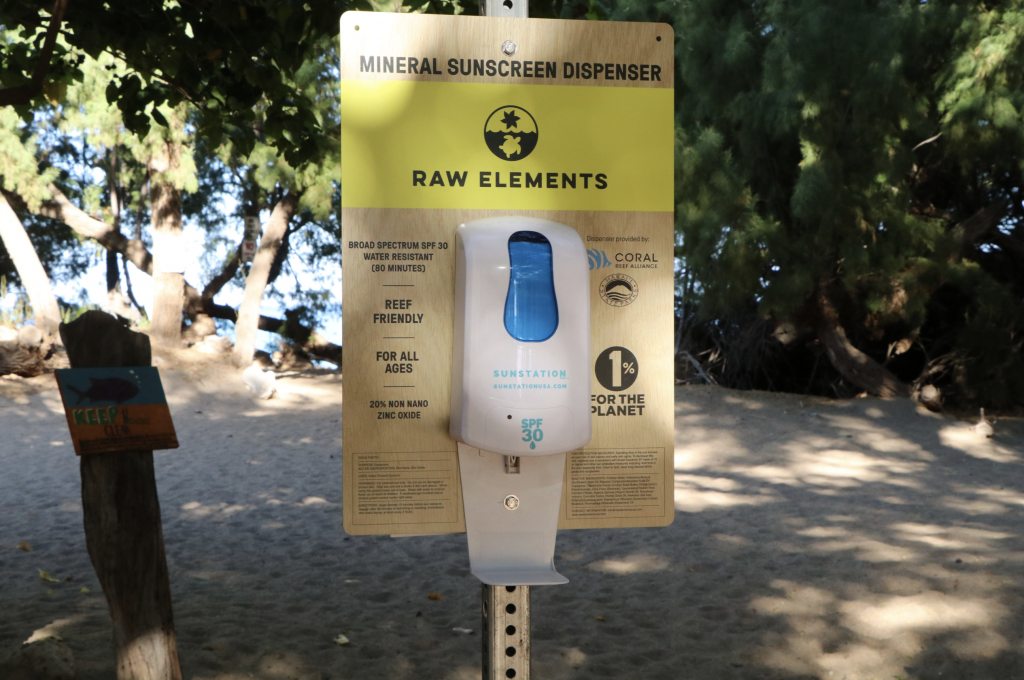Maui County Council Passes Historic Bill Prohibiting Non-Mineral Sunscreens


The Maui County Council unanimously passed Bill 135 to prohibit the sale, distribution, or use of non-mineral sunscreens. The bill was introduced by Maui County Council Member Tamara Paltin and pushed by Council Member Kelly Takaya King, chair of the Council’s Climate Action, Resilience, and Environment Committee.
Bill 135 recognizes that a number of non-mineral sunscreens have recently been demonstrated to pose a threat to the health of coastal waters, coral reefs, and other marine species.
Zinc oxide and titanium dioxide are known as “mineral sunscreens.” Non-mineral sunscreens include chemical sunscreens such as octinoxate, octocrylene, and oxybenzone. Of the sixteen active ingredients currently used as UV filters in sunscreen products, only zinc oxide and titanium dioxide are deemed generally recognized as safe and effective by the United States Food and Drug Administration.
“Non-mineral sunscreens are an aggressive pollutant,” said Councilmember King. “Our coral reefs are our first defense against erosion from sea level rise and, in addition to the threats of climate change and ocean warming, runoff from storms and development, and seepage from wastewater injection wells, chemical sunscreens cause extensive harm to our reef systems and marine life. Bill 135 is one important step toward protecting the health and resilience of our reef and marine life by removing a significant ecological stressor.”
Once signed into law, Bill 135 will take effect on Oct. 1, 2022. According to the bill, administration of the new prohibitions is the responsibility of the County Department of Environmental Management. The sale, distribution, or use of prohibited non-mineral sunscreens would be considered a violation of the Maui County Code, subject to penalties and enforcement procedures. Fines will be deposited into the County Environmental Protection and Sustainability Fund.
“Our reefs are invaluable,” said King. “Coral reefs are essential for the livelihood of many residents of Maui County, the perpetuation of cultural practices, and the protection of coastal areas. Our marine environment provides opportunities for recreation, inspiration, and scenic beauty for residents and visitors. We must do what is necessary to preserve and protect it.”
Bill 135 was supported by researchers, environmental organizations, local youth, the County Administration, and the Department of Land and Natural Resources.
While working at the ʻĀhihi Kīnaʻu Natural Area Reserve in South Maui, Jeff Bagshaw of the DLNR Division of Forestry and Wildlife became one of the earliest advocates of banning non-mineral based sunscreens. He testified before the County Council in support of the Maui ban.

“I’m so pleased Maui is leading the way in keeping harmful chemicals out of our ocean waters,” Bagshaw said. “We look forward to a time when 55-gallon barrels of chemicals that kill and damage coral reefs are no longer an issue. That’s the quantity of sunscreen chemicals experts have told us wash into Maui’s nearshore waters every day.”
His DLNR colleague Peter Landon, who manages ʻĀhihi Kīnaʻu Natural Area Reserve, was also an early supporter of the outright ban on non-mineral sunscreens. “You can see with your own eyes the sheen of chemicals shining in the top of the water column,” he said. “Imagine the impact this stuff has on the coral reef ecosystem. I and many others applaud the County Council for this landmark measure.”
Dr. Craig Downs, a leading expert in the field whose groundbreaking research connected the use of non-mineral sunscreens to coral reef decline, recognized the historic nature of the bill.
“Maui’s Bill 135 is the first regulation in the US that protects its natural resources from all the potential environmentally harmful petrochemical sunscreen ingredients, and only allows for mineral sunscreens,” said Downs. “This audacious measure should inspire governments the world over that wise conservation measures can help mold tourism to be ecologically sustainable and profitable, while ensuring the conservation of one of its most treasured natural resources.”

“I commend and thank the Council, and all supporters of this bold action, which is aligned with the Council’s recently adopted resolution to commit to protecting biodiversity,” said Councilmember King.
As the only Maui resident to participate in the United Nations global climate change conference earlier this month, King was authorized by County Resolution 21-166 and a mayoral proclamation to sign the Edinburgh Declaration on the post-2020 global biodiversity framework on behalf of Maui County.
Bill 135 now heads to the mayor for his signature.

* This story was updated from its original version to accurately reflect the bill’s author.








